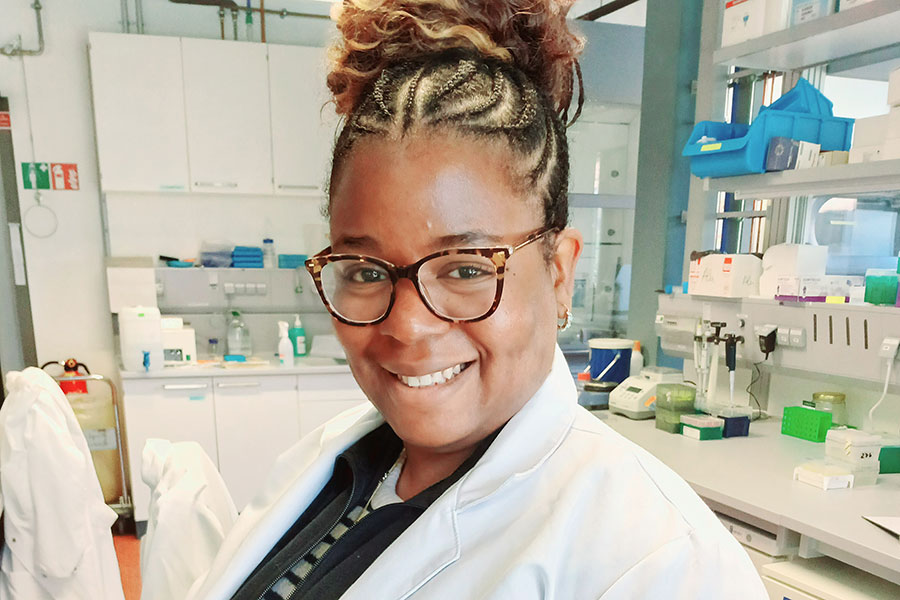
Depression is a worldwide epidemic on track to become second only to cardiovascular disease in terms of global disease burden. Recent Florida State University graduate Nella Delva is helping address this epidemic through groundbreaking research in Berlin, Germany, as part of the Fulbright U.S. Student Program.
Delva, who graduated with her Ph.D. from the Department of Biomedical Sciences at FSU’s College of Medicine in May, spent the past year expanding her studies with enhanced technology at the Max Delbrück Center for Molecular Medicine in Berlin as a recipient of the Fulbright Study/Research Award.
“Participating in the Fulbright Program was really the best decision, even though I didn’t really think that this whole idea would ever come to life,” Delva said.
The Fulbright Program is the flagship international educational exchange program sponsored by the U.S. government and is designed to increase mutual understanding between U.S. citizens and people of other countries. The primary source of funding is an annual appropriation made by the U.S. Congress to the U.S. Department of State Bureau of Educational and Cultural Affairs. Participating governments, host institutions, corporations and foundations in foreign countries and in the United States also provide direct and indirect support.
Fulbright U.S. Student Program grant recipients are selected based on academic or professional achievement and demonstrated leadership potential in their fields, with the program operating in over 160 countries worldwide.
“It enriches you in ways you didn’t think it would, in your personal life and critical thinking as well,” Delva said.
Her Fulbright award allowed her to join one of Germany’s top research centers — part of the Helmholtz Association, the country’s largest scientific organization. Delva’s research focuses on dopamine, a brain chemical less studied than serotonin in depression research. Specifically, she is exploring D1 receptors, a type of dopamine receptor found on certain neurons in the brain’s cerebral cortex.
“My dissertation really started by wanting to understand a subset of cells in the brain — molecular markers of new depressive disorders — and how they impact behavior,” she said.
With access to advanced technology at the Max Delbrück Center, Delva used induced pluripotent stem cells — adult cells reprogrammed into an embryonic-like state — to model how changes in dopamine receptors affect brain function. Her work has since expanded to look at other molecular modifiers of stress and neurodevelopment.

Delva’s path to this moment wasn’t easy. A Haitian immigrant, she grew up seeing the resilience of community in the face of adversity. That experience shaped her commitment to global health and underserved communities.
“My background has fueled my passion for research aimed at understanding and addressing complex global health challenges, especially in underserved populations,” she said.
Despite the demands of her program, she immersed herself in opportunities through The Graduate School, pursuing leadership roles and learning from others in the community. She became involved with the Congress of Graduate Students, which she found life changing.
“Other people saw qualities that I didn’t see in myself and encouraged me to do things that changed my whole perspective in life, my professional and personal life,” Delva said. “I’m really grateful for that overall experience of being a student, not just in academics, but in leadership and making connections, now internationally.”
It was through these connections that she found herself at a workshop about applying to the Fulbright Program hosted by the Office of Graduate Fellowships and Awards (OGFA).
“Fulbright is something that I called a dream in my head that would be so cool to do but never thought I would be here,” she said.
Keith McCall, assistant director of OGFA, guided her through the process. Now, Delva is not only expanding her research, but also gaining insight into international work culture.
Delva has thrived in the collaborative environment at the Max Delbrück Center. In addition to enriching her academic resources, the Fulbright Program also expanded her understanding of professionalism and lifestyle.
“I’ve found that even if I don’t have anything planned for the day, I’m always learning anyway,” Delva said. “And of course, Europeans are very organized in a sense, and they value their lunch time and their breaks, so having lunch with them and being a part of those different cultural aspects while working has been very fulfilling.”
She plans to continue her work through postdoctoral research in Germany and hopes to teach and help build stronger global research networks in the long term.
“I really want to embark on a journey of teaching, but in a way to enrich international collaboration,” Delva said. “I think there’s a lot more that could be accomplished.”
She believes shared knowledge and access to new technology across countries can help accelerate progress, especially in mental health research.
“My experiences studying and working in different countries opened my eyes to the power of global science to drive innovation and equity in health care,” she said.
Delva documents her experiences on her blog, STEM-azing.com, where she shares insight on her Ph.D. and Fulbright journeys.
Interested in applying for a Fulbright?
Graduate students: Contact Keith McCall, assistant director of the Office of Graduate Fellowships and Awards, at kmccall2@fsu.edu.
Undergraduates: Contact Jesse Wieland, associate director of the Office of National Fellowships, at awieland@fsu.edu.
Faculty: Contact Peggy Wright-Cleveland, director of Faculty Development, at mwrightc@fsu.edu.





